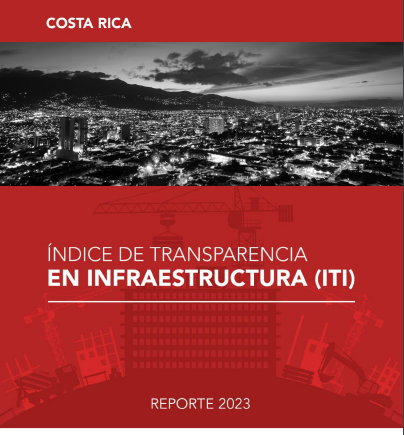CoST Costa Rica, a member of CoST, The Infrastructure Transparency Initiative, recently published their second edition of the Infrastructure Transparency Index (ITI). The results highlight progress that the country has made in driving transparency in public infrastructure projects.
The ITI is an international instrument which assesses a region’s level of transparency in public infrastructure. This is through four dimensions: the enabling environment through frameworks and digital platforms; the capacities and processes that facilitate transparency in the institutions that carry out public works; inclusive citizen participation in the construction of public works; and the disclosure of information on public works projects at different stages of their life cycle.
The evaluated institutions presented 83% of the entire budget allocated to public infrastructure in the period 2018-2022; and a sample of 60 highly relevant projects developed by these institutions in the same period.
Like any ITI result, ranking of public institutions helps recognize good transparency practices, both in the disclosure of information on the public works they carry out and in institutional capacities.
The average score of the 30 institutions across the total four dimensions was 53 points out of 100 – an increase from 48 points in 2021. This shows that, although there are good practices in some institutions and improvements have been made, there are still many opportunities for improvement.
Enabling environment
Regarding the enabling environment, the report states that existing regulations in the country do not indicate the specific data that public institutions must disclose about the public works projects they execute, which would allow for uniformity in the information published and for it to cover the complete life cycle of a project.
There still isn’t a single online platform that consolidates all the information on the life cycle of public infrastructure projects for all the institutions in the sector; the information is fragmented, making it significantly difficult for citizens and other stakeholders to access information on all the projects being developed in the country for different periods.
The score assigned, according to the evaluation, was 47 points out of 100; that means that the country improved 17 points with respect to the ITI 2021 edition, in which it obtained 30 points.
Capabilities and processes
On the dimension of capabilities and processes, the ITI 2023 recognizes improvements compared to 2021 in the institutions associated with transparency knowledge, as well as in their digital capabilities, which – in return – is reflected in a score of 55/100, for an improvement of 13 points compared to the score of 42 in 2021.
However, it points to a significant lack of knowledge of data standards that can contribute to the disclosure of information and a lack of knowledge of how much project-specific information was disclosed by the institutions themselves and limitations for the publication of information in the open data condition.
It is important to highlight that a significant number of institutions lack a procedure for the proactive publication of information and for responding to citizen requests for information on public projects.
Citizen participation
Regarding citizen participation, the score improved 16 points, with 53/100, compared to 37/100 in the ITI 2021. However, the results showed weaknesses when considering an inclusive and available approach for the different stages of public works projects, which limits the enrichment of the information available on the projects with citizen contributions such as: historical background of the site, information for the design of the project, feedback on the construction proposal, impact of the construction on settlements, control over the progress of the project, etc. In addition, the results showed that almost no project registered improvements in response to citizen participation.
On information disclosure, which evaluated the availability of information for 60 public projects, the report reveals that there were no improvements between 2018-2022 compared to the previous evaluation period (ITI 2021).
The limitations in information were associated with environmental impact studies, land and settlement impact studies, total project budget, financing sources, construction contracting processes, as well as construction supervision, among other things.
However, more significantly and sensitively, in most of the projects evaluated, it was not possible to find information that would indicate whether the work contracts varied in scope, cost and time, as well as the justifications for these changes, which is key in the fight against corruption. This is reflected in the decrease in the score from 67/100 in 2021 to 54/100 in 2023, that is, 13 points down.
Recommendations
CoST Costa Rica’s ITI 2023 Report recommends the implementation of OC4IDS, a data standard for the disclosure of public works information, in all public infrastructure processes for all public sector institutions; as well as a single digital platform that allows the public to have access to the consolidated information of all projects in accordance with this standard.
Likewise, it suggests designing and implementing an integrated dissemination and training plan aimed at public officials and citizens, on transparency in public projects and the use of information to improve the development of the same.
See the 2021 Costa Rica ITI Report HERE
See the 2023 Costa Rica ITI Report HERE
